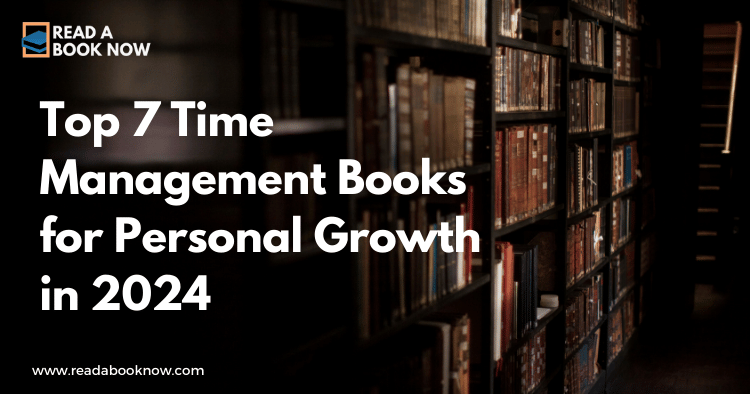Table of Contents
- Introduction
- 1. “Atomic Habits” by James Clear
- 2. “Getting Things Done” by David Allen
- 3. “The 7 Habits of Highly Effective People” by Stephen R. Covey
- 4. “Essentialism: The Disciplined Pursuit of Less” by Greg McKeown
- 5. “Deep Work” by Cal Newport
- 6. “Eat That Frog!” by Brian Tracy
- 7. “The One Thing” by Gary Keller and Jay Papasan
- Conclusion
- FAQs
Introduction
Time is one of our most precious resources, and managing it effectively can lead to personal growth and enhanced productivity. With the dawn of 2024, it’s the perfect time to reassess your time management strategies and explore new ideas that can help you make the most of your days. In this blog post, we’ll dive into the top seven time management books of 2024 that promise to inspire and equip you with essential skills for a more productive life. Whether you’re a busy professional, a student juggling commitments, or simply someone looking to optimize your daily routines, these books offer valuable insights to help you take control of your time.
1. “Atomic Habits” by James Clear
James Clear’s “Atomic Habits” emphasizes the power of small changes. Clear presents the idea that tiny habits can accumulate to produce significant results over time. This book provides a practical framework for habit formation and time management, focusing on four key laws: make it obvious, make it attractive, make it easy, and make it satisfying.
Key Takeaways:
- Small changes can lead to remarkable results.
- The importance of systems over goals.
- Techniques to build good habits and break bad ones.
“Success is the product of daily habits—not once-in-a-lifetime transformations.”
“Atomic Habits” is perfect for anyone looking to improve their daily routines and time management skills. The actionable strategies presented can help you develop habits that stick, leading to personal growth and increased productivity.
2. “Getting Things Done” by David Allen
David Allen’s “Getting Things Done” (GTD) is a classic in the world of time management. The GTD method focuses on organizing tasks and projects to reduce stress and enhance focus. Allen introduces a workflow that helps you capture, clarify, organize, reflect, and engage with your tasks effectively.
Key Takeaways:
- The importance of capturing everything that requires your attention.
- How to categorize tasks based on context and priority.
- The weekly review process to keep your system updated.
“Your mind is for having ideas, not holding them.”
This book is ideal for those who feel overwhelmed by their to-do lists and seek a systematic approach to regain control over their time.
3. “The 7 Habits of Highly Effective People” by Stephen R. Covey
Stephen R. Covey’s “The 7 Habits of Highly Effective People” blends time management with personal development. Covey emphasizes principles of effectiveness that encourage readers to become proactive and prioritize what truly matters.
Key Takeaways:
- The importance of being proactive rather than reactive.
- Prioritizing tasks based on urgency and importance.
- Developing a win-win mindset in personal and professional relationships.
“The key is not to prioritize what’s on your schedule, but to schedule your priorities.”
Covey’s work is a must-read for anyone looking to align their time management strategies with their personal values and goals.
4. “Essentialism: The Disciplined Pursuit of Less” by Greg McKeown
Greg McKeown’s “Essentialism” advocates for doing less but better. This book encourages readers to focus on what truly matters and eliminate the non-essential. It’s a refreshing approach to time management that emphasizes quality over quantity.
Key Takeaways:
- The power of saying no to non-essential tasks.
- Identifying what is truly essential in your life.
- Strategies to create space for what matters most.
“If you don’t prioritize your life, someone else will.”
If you find yourself stretched too thin, “Essentialism” can help you reclaim your time and energy for the things that genuinely matter.
5. “Deep Work” by Cal Newport
Cal Newport’s “Deep Work” focuses on the ability to concentrate without distraction on cognitively demanding tasks. Newport argues that this skill is increasingly rare yet essential for achieving high levels of success and productivity.
Key Takeaways:
- The difference between shallow and deep work.
- Techniques for cultivating deep work in your daily routine.
- The importance of minimizing distractions to enhance focus.
“Deep work is the ability to focus without distraction on a cognitively demanding task.”
“Deep Work” is perfect for knowledge workers and anyone looking to enhance their focus and productivity in an increasingly distracted world.
6. “Eat That Frog!” by Brian Tracy
Brian Tracy’s “Eat That Frog!” offers a straightforward approach to time management by tackling procrastination. The book is built around the idea that if you tackle your most challenging task first thing in the morning, you’ll set a positive tone for the rest of your day.
Key Takeaways:
- The importance of prioritizing tasks based on their impact.
- Practical techniques to overcome procrastination.
- Strategies for staying organized and productive.
“If you have to eat two frogs, eat the ugliest one first.”
This book is perfect for anyone who struggles with procrastination and needs a push to get started on their most important tasks.
7. “The One Thing” by Gary Keller and Jay Papasan
In “The One Thing,” Gary Keller and Jay Papasan encourage readers to focus on the one task that matters most at any given time. This book provides a simple but powerful framework for prioritizing tasks and managing time effectively.
Key Takeaways:
- The importance of focusing on one thing at a time.
- The domino effect of prioritizing your most important task.
- Practical tips for time blocking and managing distractions.
“What’s the one thing you can do such that by doing it everything else will be easier or unnecessary?”
“The One Thing” is a must-read for anyone feeling overwhelmed by multitasking and seeking clarity in their daily priorities.
Conclusion
As we step into 2024, investing in your time management skills can lead to significant personal growth. The books mentioned above provide valuable insights and practical strategies to help you manage your time effectively. By implementing the lessons learned from these authors, you can enhance your productivity, reduce stress, and ultimately lead a more fulfilling life. For further insights into literature that could inspire your time management journey, consider exploring classic works that emphasize personal development and discipline, such as those listed in Top 10 Must-Read 19th Century Classics for Every Book Lover.
FAQs
Q: How can I improve my time management skills?
A: Start by assessing how you currently spend your time. Use tools like planners or apps to track your activities, and read time management books like those listed above to gain new perspectives.
Q: Is multitasking a good strategy for time management?
A: Generally, multitasking can lead to decreased productivity and more errors. It’s often more effective to focus on one task at a time, as emphasized in “The One Thing” and “Deep Work.”
Q: How can I overcome procrastination?
A: Techniques such as breaking tasks into smaller steps, setting deadlines, and using the “Eat That Frog!” method can help combat procrastination.
By diving into these books and applying their principles, you can take significant steps toward mastering time management and achieving your personal growth goals in 2024. Happy reading!




